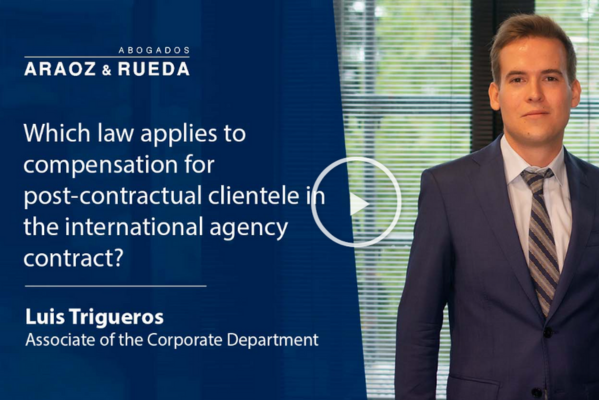By means of an international agency contract, one party (the principal) empowers another party (the agent) – the latter as an independent intermediary – to enter into foreign trade transactions on behalf of the principal and on a continuous basis.
The termination of agency agreements may give rise, among other consequences, to the emergence of a right in favour of the agent to compensation for damages or “goodwill”.
This indemnity arises from the fact that the principal may continue to obtain economic gains from the customers provided by the agent, even after the contract has terminated.
The law applicable to the agency relationship determines the scope of the compensation as well as its quantification.
In general, the law applicable to agency agreements is based on the “freedom of choice” principle.
In this regard, Article 3 of the Rome I Regulation on the law applicable to contractual obligations provides that the contract shall be governed by the law chosen by the parties, even if it is not the law of a member state of the European Union.
Notwithstanding the above, there are cases where the law chosen by the parties could be rejected by a court, as we will see now.
It is important to note that, when the agent is domiciled in an EU member state, the mandatory provisions of the Directive on self-employed commercial agents and consequently the corresponding national rules of transposition relating to the post-contractual right of agents to goodwill, come into play.
This means that, provided that the agent is domiciled in an EU member state, the agent’s right to compensation will be recognized (if the legal requirements are met), even if the principal is located outside the EU and the applicable law chosen by the parties is that of the principal’s domicile.
In any case, one should not forget that the European mandatory provisions on the agent’s right to compensation does not prevent the parties to subject the remaining contractual provisions to foreign law, whether EU law or not.
All EU member states have incorporated into their national legislation the corresponding protection for commercial agents in accordance with the provisions of the Directive.
According to the Directive, the amount of the indemnity may not exceed a figure equivalent to an indemnity for one year calculated from the commercial agent’s average annual remuneration over the preceding five years.
If the contract goes back less than five years, the indemnity shall be calculated on the average for the period in question. Spain, like many other member states, has opted for a literal transposition of this provision.
However, some EU states have limited themselves to transposing the minimum level of protection required by the Directive (e.g. Bulgaria), while others have transposed national rules with a higher level of protection (e.g. Belgium).
In relation to the above, it is important to mention the Judgment of the EU Court of Justice of 17 October 2013 (Unamar case) which established that the law chosen by the parties to an international agency contract may be rejected by a European court that is hearing the case, provided that said law only guarantees the minimum protection prescribed in the Directive.
In such a case, the court may instead apply the lex fori (the law of the state where the court is located, which normally matches the agent’s domicile) based on the mandatory nature of the lex fori and provided that it grants the agent more extensive protection than the protection offered in the Directive.
An agent could file a claim for compensation before the courts of its domicile, breaching a contractual jurisdiction and governing law clause, to seek greater protection under the laws of the country of its domicile (provided that such protection is higher than the one offered by the law applicable to the contract).
Although it is true that, thanks to the harmonising effects of the Directive, European judges and courts apply consistent rules that provide legal certainty to the market players, answering the question of the law applicable to the agent’s right to compensation is not a simple task and requires a case-by-case assessment.





